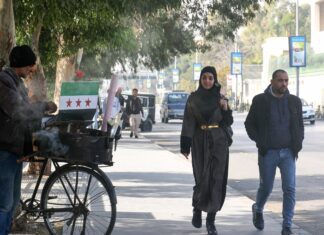
The Syrian Ministry of Interior established new anti-narcotics branches within its security forces, marking a shift from years in which drug trafficking thrived under the protection of the former Assad regime. On Aug. 10, Interior Minister Anas Khattab congratulated the first group of officers to complete specialized anti-drug training in Idlib province.
“We congratulate our graduates in the first batch of the anti-drug course who joined the fields of duty at the Ministry of Interior, after passing the training efficiently and distinctively,” Khattab said in a post on X. He added that combating narcotics is “a national and social responsibility,” stressing the ministry’s commitment to protecting Syria’s youth.
The ceremony, held in Harem, included demonstrations by the K9 unit and drew attendance from Qatari and Iraqi officials. Khattab described their presence as a sign of “Arab partnership and coordination in support of security and drug control issues.”
Operations Against Captagon Smuggling
The ministry’s announcement came as new branches began field operations across Syria. In Daraa province, officers carried out an ambush that intercepted a large shipment of Captagon pills concealed inside tomato paste containers. Brig. Gen. Khalid Eid, director of the Syrian Anti-Narcotics Department, said the drugs were seized and will be destroyed in accordance with law.
In Aleppo, authorities dismantled a trafficking network, confiscating roughly 200,000 Captagon pills and arresting suspects. Eid noted that graduates of the ministry’s four-month anti-narcotics course had taken part in these operations, which combined field tactics with training in legal procedures.
Targeting the Former Regime’s Networks
The ministry has also reported raids on warehouses and production sites previously linked to the Fourth Division, a military unit accused of overseeing much of Syria’s drug trade in recent years. Officials said seizures included machinery used to manufacture Captagon, along with large stockpiles of pills.
In a statement, the Interior Ministry stressed that legitimate commercial brands were not tied to the seized tomato paste containers used for smuggling, underscoring traffickers’ reliance on disguising narcotics within legal shipments.
Building a New Security Landscape
Interior Ministry spokesman Nouruddin al-Baba said the fall of what he called the “extermination and Captagon regime” had spared Syrian youth from a future defined by drugs and organized crime. “We graduated, thanks to God, hundreds of heroic personnel in the Ministry of Interior in the field of drug control,” Baba wrote on X, adding that more recruits will soon join.
The ministry has framed the anti-narcotics campaign as both a security necessity and a step toward repairing Syria’s social fabric. By training specialized officers and cooperating with regional partners, officials say they aim to confront what they describe as a heavy legacy of trafficking and smuggling left behind by the former government.








